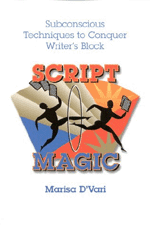
Art of the Schmooze: Networking in Hollywood
Written by Marisa D. Vari, author of 'Script Magic: Subconscious Techniques to Conquer Writer's Block' | Posted by: Anonymous
Throughout the entertainment business, networking is a way of life. In an ideal universe, it starts in college when the savvy screenwriter scores a top flight summer internship at a top entertainment-related company. Then it continues after graduation by snaring a job at one of the larger talent agencies or studios, especially with a boss with clout. The friendships and network one can develop during this period pays off in a few years time, when individuals in your network could very well be in the position to buy your work.
But what happens if, like many of the students in my creativity and screenwriting seminars, you’re a 40-year-old lawyer with a screenplay? What if you’re outside the industry with a hot script you need to get to the right agent or producer?
With focus and concentration, you can build a network and get your script read by the right people, and sold. This multi-part process is partially based on a creativity model in my just-released book, SCRIPT MAGIC: Subconscious Techniques to Conquer Writer’s Block (Michael Wiese Productions, April 2000).
The first step in developing a networking plan is research. Ask the librarian how to access the various film organizations in your area. In the movie mecca of Los Angeles, you’ll find dozens of screenwriting organizations ranging from Women in Film (men are welcome as members too) and The Scriptwriter’s Network. But there are also groups in other cities, and if the public librarian isn’t aware of them, check with the film or communications department in your local university or college. Join these groups and begin to get to know and share information with members. Make it a point to attend weekend writing workshops at institutions such as the American Film Institute. These workshops feature prominent speakers who may be in a position to help you. It’s okay to briefly introduce yourself after the lecture, but don’t crowd them or make a pitch for your script right then and there. Instead, send them a letter (one preferably written with wit and sincere thanks) that tells them a little about your screenplay and yourself and why it will be right for them (i.e. it’s in the genre of films they usually produce, it has a good role for an actor/actress they usually work with, etc).
Taking a screenwriting or film production course at UCLA Extension can be valuable in more ways than one, especially if the instructor is a major player in the industry, or the class is relatively small and continues for several weeks. If the instructor responds to you and your work, there’s a good chance he or she will help you make introductions to agents and producers.
The Internet is a great place to join informal screenwriting groups where you can exchange gossip, hear who’s buying, and get a taste of the latest industry buzz. Lurk on live chats featuring top Hollywood players and send them a letter afterwards, mentioning points raised in the chat and launching into a pitch for your script, again detailing why it’s tailor made for them. A great option, especially for those who need to jump start their networking abilities, is to take a course at the FlashForward Institute (held in various cities through the year), where co-founder, TV producer Heidi Wall, orchestrates a program designed to bring writers, producers, actors, and directors together, put them in groups, and pool their resources so that each may reach the people they need to contact in order to bring their dreams to fruition.
Also, don’t dismiss the more social benefits of joining health clubs where the right kind of networking could pay off in a major way. Becoming a regular at industry restaurants is another way to go.
Once you’ve researched organizations, screenwriting groups, Internet opportunities, and physical clubs, bars, and restaurants, it’s time for the incubation period. Don’t do anything or join anything just yet — give the information time to simmer a bit while you turn your attention to another activity. Your brain is now processing the information in the background.
When you feel you’re ready, take out a large sheet of paper and some brightly colored crayons. This is an exercise called "Mind Mapping" that I detail in Script Magic, designed to shut down the critical left brain and encourage creative "right brain thinking." Begin to draw out your personal plan of action, based on your location, as well as the amount of money and time you can put aside for networking. When you’re finished, "translate" your Mind Map into words, and begin the third process, implementation.
Savvy networking will never replace a great story, but networking is the quickest way to learn about the industry. An unproduced screenwriter can benefit from creating a positive impression on a producer or executive, which might dispose them to dig a script out of the slush pile or take a second look at it. Often, that is the only difference between a screenplay stuffed into the sock drawer, and one that makes millions at the box office.
But to take full advantage of successful networking, it’s important to take it one step further by mastering the subconscious technique of visualization, which can be used to perfect your writing as well. Like Mind Mapping, visualization brings out the full force of your creativity.
Briefly, the process is based on the fact that our cells have memory, and that our brain cannot tell the difference between something we see in a dream, a fantasy, or have experienced in reality. By focusing on a vision of yourself successfully networking with people in a position to help you, and visualizing their eagerness to read your material, you’ll ultimately attain the vision you see.
You may have the talent, but you’ll never get anywhere working alone in a dark room. Research the networking organizations available to you, develop an action plan, and visualize success! There‚s nothing stopping you from achieving your dreams but the strength of your desire.
Script Magic: Subconscious Techniques to Conquer Writer's Block by Marisa D‚Vari (IBSN: 0941188-74-4) has just been published by Michael Wiese Productions and is available at Amazon, Barnes and Noble, and Borders online as well as your favorite bookstore. Check out the www.scriptmagic.com web site for a free seven-day seminar via autoresponder, free newsletter subscription, interviews with top writers, producers, directors, and much more!










